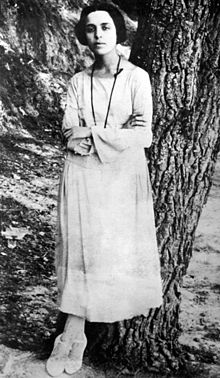Maria Polydouri: Difference between revisions
No edit summary Tag: extraneous markup |
No edit summary |
||
| Line 1: | Line 1: | ||
<gallery> |
<gallery> |
||
Example.jpg|Caption1 |
|||
</gallery> |
</gallery> |
||
{{Multiple issues| |
{{Multiple issues| |
||
Revision as of 22:30, 3 February 2017
This article has multiple issues. Please help improve it or discuss these issues on the talk page. (Learn how and when to remove these messages)
|

Maria Polydouri (Template:Lang-el; 1 April 1902 – 29 April 1930) was a Greek poet.
Life
Polydouri was born in Kalamata. She was a contemporary of Kostas Karyotakis, with whom she had a desperate but incomplete love affair. Although she wrote poetry from at an early age, her most important poems were written during the last four years of her life, when, suffering from consumption, she was secluded in an Athens sanatorium, where she died in 1930.
Work
Critic and poet Kostas Stergiopoulos wrote: "Maria Polydouri used to write her poems as if she was writing her personal diary. The transmutation happened automatically and effortlessly. To Polydouri, expression meant straight transcribing from the facts happenning in her emotional world to the poetic language with all the idealizations and exaggerations her romantic nature dictated to her".[1]
Works
Collections:
- The chirps that faint (1928)
- Echo over chaos (1929)
Her poems (or at least a part of them) have been translated to Bulgarian, Catalan, Dutch, German, French, Italian, Macedonian, Romanian, Spanish and Swedish.[2]
References
- ^ Kostas Stergiopoulos (ed.), Greek Poetry, 3rd vol., Sokolis, Athens, 1980.
- ^ Íñiguez Rodríguez, Enrique (2016). "Los trinos que no se extinguen: reivindicación de María Polyduri y su papel para la literatura griega". In Mª Gloria Ríos Guardiola, Mª Belén Hernández González & Encarna Esteban Bernabé (ed.). Mujeres de letras: pioneras en el Arte, el Ensayismo y la Educación (in Spanish). Murcia: Consejería de Educación y Universidades. p. 485-499.
External links
 Media related to Maria Polydouri at Wikimedia Commons
Media related to Maria Polydouri at Wikimedia Commons Greek Wikisource has original text related to this article: Maria Polydouri
Greek Wikisource has original text related to this article: Maria Polydouri

